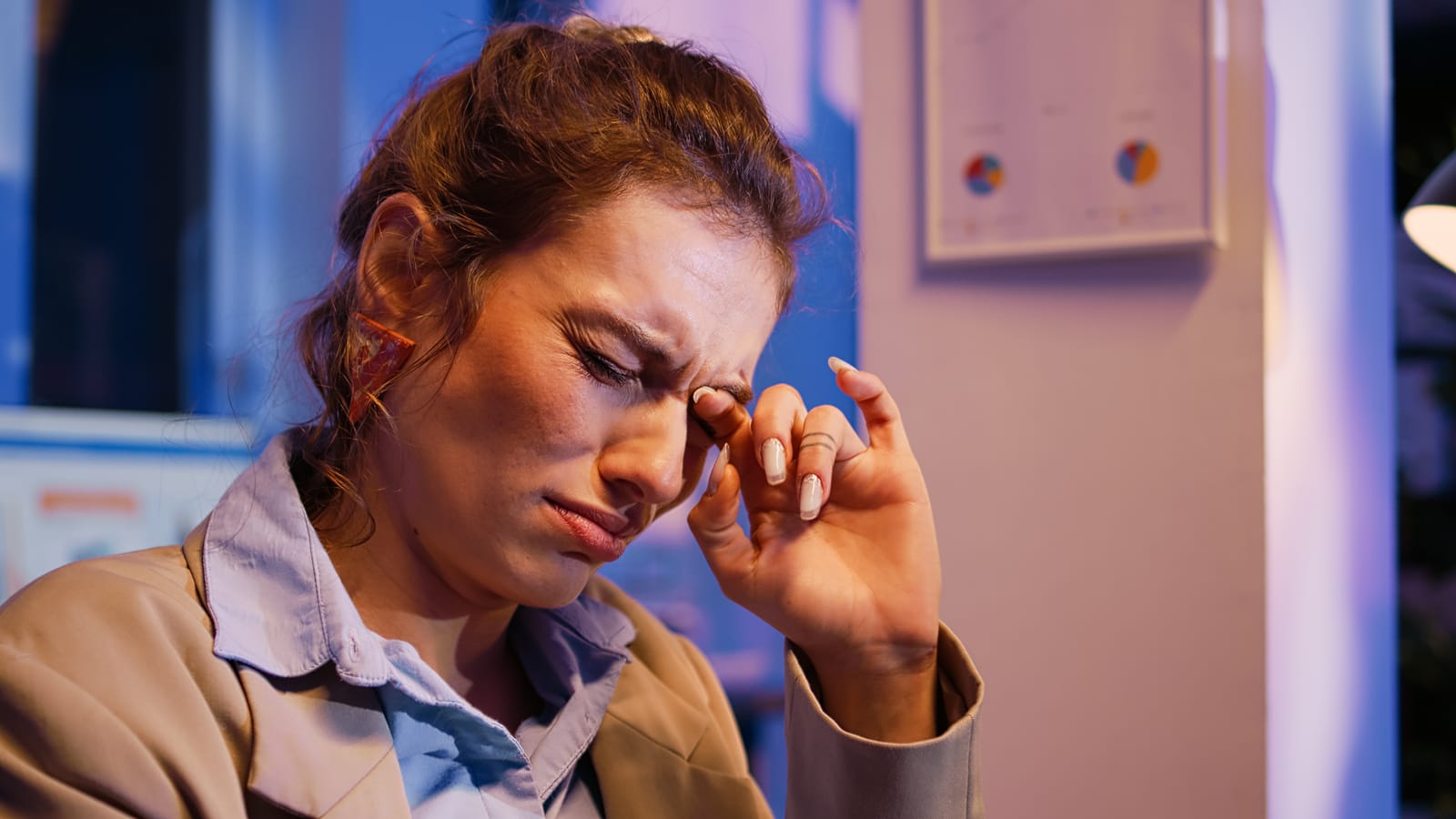This article will explore and understand the potential connection between Transcranial Magnetic Stimulation (TMS) and the experience of fatigue in patients.
Does TMS make you tired?
Many people who have tried TMS therapy have asked, “Can TMS make you tired?” because they struggle with fatigue after the fact, sometimes called “mental fatigue.”
TMS treatment is usually very well tolerated, especially compared to other treatments like prescription medications. It’s very rare that patients decide to quit TMS because of side effects, given the fact that most people don’t experience side effects and those who do only experience mild discomfort during their initial sessions.
Some patients experience discomfort at the site of the magnetic coil, and that discomfort could spread down the face and lead to small headaches or muscle spasms around the jaw area, which are mild enough to be treated with over-the-counter medication such as aspirin.
However, other patients have complained about feeling tired after a TMS session. So, does TMS therapy make you tired, and if so, why does TMS make you tired?

Why does TMS make you tired?
There are several theories and scientific explanations behind why TMS can sometimes leave behind mental fatigue as one of the symptoms.
Some patients feel a little tired after much the same as they would if they had taken a long exam or been studying for several hours. Not everyone experiences this mental fatigue, but for those who do, it is likely the result of a tension headache from tensing your muscles for too long while also engaging in things like too much screen time or inadequate rest and hydration.
These types of tension headaches or mental fatigue are a natural result of your neurons firing more often than they normally would and the connections in your brain growing, strengthening, and changing.
Think of it as a workout: after a good workout, you will feel some pain or fatigue because of what you put your muscles through; they are breaking down and growing in a stronger fashion. The same thing happens to your brain.
– The role of brain regions targeted by TMS
Your TMS session might target specific areas of the brain that can lead to feelings of tiredness. In targeting specific brain regions, your TMS sessions might remove inflammation or rebuild blood vessels and neural pathways that provide better blood flow to an area that isn’t working as it should.
– The impact of session frequency and intensity
The session frequency and intensity can also contribute to feelings of tiredness or mental fatigue. This type of mental strain and exhaustion can come when you have increased frequency or when your sessions are longer than normal.
If you normally undergo treatment sessions of only 20 minutes two times per week and you suddenly increase to 30 or 40-minute sessions four or five times per week, you might feel tired afterward because your brain is getting twice as much magnetic stimulation.
– The psychological aspect
Then, there is a psychological aspect to it. You might bring about symptoms of tiredness by simply perceiving that you will feel tired after a session. Science confirms that our perceptions can color our reality, so if you believe something to be true, you might experience it that way.

Tips for those who experience fatigue after their TMS sessions
Several factors could contribute to issues like fatigue after TMS sessions. If you are asking, “Does TMS therapy make you tired” it might be worth considering some of these tips to help you offset the severity or frequency of your headaches.
– Adequate rest
If you are experiencing tension headaches or mental fatigue, adequate rest is very important. That rest comes in many forms, not least of which is getting a solid 8 hours of sleep where you go to bed and wake up at the same time regularly.
Tip: Consider what you do during your TMS session. Staring at a screen during your session might exacerbate eye strain or stress and worsen symptoms of mental fatigue. Try bringing a physical book instead or meditating with your eyes closed during your session and see if that makes a difference.
But equally important for adequate rest is meditation throughout the day. Time for meditation or naps can help you regain focus and calm yourself so that the symptoms of your mental fatigue do not overwhelm you.
Tip: Avoid caffeine after 4:00 p.m. so that you do not have trouble sleeping because of unnecessary caffeine or sugar in your system.
– Staying hydrated
Staying hydrated and eating healthy meals is very important to managing things like tension headaches or muscle fatigue. Lack of sleep or extra adrenaline, even changes to your diet, can cause things like shaking in your hands, and these mild symptoms usually coincide with things like headaches or stress.
By staying hydrated and working on mindfulness activities to consciously relax, you can change your relationship to mental fatigue and help it go away sooner.
Tip: Drink water long before your upcoming TMS sessions. Most dehydration is the result of inadequate water consumption for the previous 24 hours, so it’s important to start drinking water the day before to help offset the symptoms of mental fatigue.
– Light exercise
Light exercise before a TMS session can be very useful in helping to loosen up your muscles and encourage better blood flow. This can make the impact of your TMS session less stressful and strenuous, which can do away with mental fatigue.
Tip: Light exercise before your TMS session, like walking around the building or going for a brisk walk in your neighborhood, can help encourage better blood flow, provide for improved sleep the following night, and reduce any anxiety or stress you might have about your TMS sessions.
– Speaking with a healthcare provider
If you are still experiencing symptoms and wondering, “Does TMS make you tired?” or “Why does TMS make you tired?” it might be worth speaking to your healthcare provider. They can review any contraindications you might be experiencing because of other medication you are on, and they can also help you devise appropriate tactics to combat mental fatigue.
Tip: Your doctor might recommend things like hand reflexology, where you can find trigger points between your thumb and your pointer finger and massage them gently to relieve the tension from your mental fatigue. They might also recommend slightly stronger prescription medication that you can take for acute symptoms.
Summing Up
Can TMS make you tired? Some people experience a bit of mental fatigue after much the same as they would after taking a stressful exam. Thankfully, there are several factors that might contribute to this, all of which can be easily managed. It’s always best to consult with your medical professional regarding your unique situations and responses to TMS.
